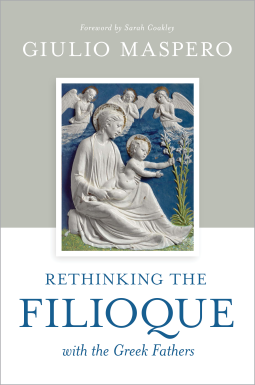
Rethinking the Filioque with the Greek Fathers
by Giulio Maspero
This title was previously available on NetGalley and is now archived.
Send NetGalley books directly to your Kindle or Kindle app
1
To read on a Kindle or Kindle app, please add kindle@netgalley.com as an approved email address to receive files in your Amazon account. Click here for step-by-step instructions.
2
Also find your Kindle email address within your Amazon account, and enter it here.
Pub Date Jul 27 2023 | Archive Date Dec 08 2025
Talking about this book? Use #RethinkingtheFilioquewiththeGreekFathers #NetGalley. More hashtag tips!
Description
Does the Holy Spirit proceed only from the Father—or also from the Son?
Protestants and Roman Catholics might immediately answer the latter and wonder why their Orthodox friends protest. Historically one of the major obstacles to Christian unity across the East-West divide, the Filioque—the part of the Latin translation of the Nicene Creed claiming the Holy Spirit proceeds from the Father and the Son—still bedevils Trinitarian theologians today.
How can the church possibly achieve unity in the face of this dogmatic difference, implacable for over a millennium? Giulio Maspero shows us how the answer can be found in history. In the fourth century, when Pneumatomachians denied the divinity of the Holy Spirit, the Cappadocian Fathers came to a relational understanding of the most elusive person of the Trinity: the Holy Spirit was conceived of as the glory and power eternally exchanged between the Father and the Son. In fact, this understanding is still fundamentally shared by Eastern and Western Christians. Examining Syriac traditions as an example, Maspero observes that both Syriac and Latin lack the linguistic precision to describe the nature of the Holy Spirit’s procession from the Trinity in the same way as Greek, hence the ambiguous Filioque.
Yet what might be seen on the surface as a mere translation error reveals deep questions about the triune nature of God. With rigorous theological argument, Maspero ultimately proposes a way forward for East and West—one based not on centuries of polemics, but on a common tradition established by the Greek Fathers. Essential reading for the ecumenically minded theologian, Rethinking the Filioque with the Greek Fathers takes a crucial step toward Christian unity.
Table of Contents
Foreword by Sarah Coakley
List of Abbreviations
Introduction: History or Theology?
1. Images and Models: Origen’s Legacy
2. The Turning Point: From the Third to the Fourth Century
3. The Pneumatomachian Crisis: Generation and Procession
4. Gregory of Nyssa: The Spirit’s Theologian
5. The Surprise: A Greek Filioque?
6. The Litmus Test: Syriac Theology and Translations
7. Another Surprise: Greek Psychological Analogies
8. Augustine’s Question: Western Metaphysical Poverty
Conclusion: An Ecumenical Proposal
Bibliography
Indexes
Available Editions
| EDITION | Hardcover |
| ISBN | 9780802883056 |
| PRICE | $49.99 (USD) |
| PAGES | 326 |



